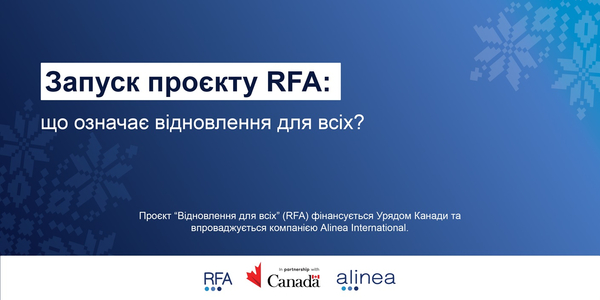RFA Launches: What does recovery for all mean?
This is a recovery that addresses real people's needs, strengthens the local economy, engages communities in decision-making, and helps build a strong, just, and resilient future for Ukraine.
“We understand that recovery isn't just about rebuilding the things that were broken, rebuilding infrastructure, but it's about making the situation of Ukrainians better economically and socially”, said Tawnia Sanford Ammar, RFA Director, during the work meeting with RFA’s initial 19 pilot communities from seven oblasts of Ukraine.
The Recovery for All project is working to help communities ensure that recovery is comprehensive; first, in terms of the scope of recovery. It should encompass not only infrastructure, but also the sectors that are often described as “soft”: healthcare, education and social services. However, these sectors provide services most directly to Ukrainians, and if those services are lacking, citizens suffer the consequences of this first.
Communities' representatives noted that indeed, while infrastructure was an oppressing need, particularly in terms of long-standing issues such as water supply systems, primary healthcare was mentioned by several communities as a critical need. In addition, communities mention that the lack of access to quality education for children needs to be addressed immediately.
“Our community still has only distance learning because not all educational institutions have shelters. This is one of the great needs. This is probably the biggest pain of parents that their children do not have access to quality education”, added Tetiana Postna, Head of the Department of Social and Economic Development and International Cooperation of the Zelenodolska community.
“If we talk about recovery in terms of building back better, then, of course, we are talking about recovery that includes a development component. This is because, in many cases, the infrastructure that was destroyed did not meet the requirements of inclusivity, accessibility, and the UN Sustainable Development Goals. Therefore, we must integrate all these aspects into the recovery process,” stated Oleksii Riabykin, Deputy Minister for Development of Communities and Territories of Ukraine.
In the same way that building back better in terms of infrastructure implies working in a new way, using standards that fit today’s circumstances but also planning for long-term sustainability and our future generations, building back better economically and socially requires an evaluation of the issues in the current state. As the RFA Director noted,
“We don’t want to build back better necessarily in those sectors in the same way we had them before the full-scale invasion, because we know that there was room for improvement. We know that there were reforms that were happening at that time. But secondly, we know that the situation has changed for you demographically; it's changed economically; it's changed socially, with people coming into your communities, people leaving your communities”.
“Canada supports communities that have been at the front line of the unjustified invasion by Russia here in your country. Through this RfA initiative, we hope to support you with the tools and the capacity to build back better. We believe very firmly that gender equality, inclusion, diversity are important elements to build back better, to have local governance and to have services available to the most marginalized community members. That is the true test of good governance wherever you are, whether you're in Canada or Ukraine; it's how we take care of those people who need the support the most”, noted at the beginning of the meeting Christine Skladany, Acting Head of Development Cooperation at the Embassy of Canada to Ukraine.
The RFA project is aimed at:
- Recovery planning and implementation, ensuring citizens and all stakeholders are involved,
- Supporting in the implementation of governance, social and economy recovery initiatives,
- Facilitating of partnerships with development, humanitarian and private sector partners to attract resources
- Monitoring and evaluation of recovery efforts.
Over the next two months, individual meetings with communities will take place, helping to kick-start collaborative work within the RFA project as soon as possible!
"So we understand that there's a lot of work to do to adjust those plans to meet the needs of various groups of citizens, from young people to the oldest members of your communities, to those people that have relocated either in or out, to veterans, and to those people that have special educational, maybe medical or social needs that are perhaps socially vulnerable. These are the kinds of issues that we want to make sure we address so that when we have a recovery, we don't have certain groups that are left behind, that are forgotten”, summarized Tawnia Sanford Ammar, Country Director for Ukraine, RFA Project Director.
The Recovery for All (RFA) project, funded by the Government of Canada and implemented by Alinea International, will support 50 war-affected communities take on the massive task of managing the damage that has been inflicted by Russia’s war against Ukraine.

04 July 2025
Розробка Комплексного плану просторового розвитку як можливість ефективної відбудови громади
Розробка Комплексного плану просторового...
Не раз доводиться чути, що впровадження просторового планування – не на часі. Але Харківщина доводить протилежне....
04 July 2025
Як громадам успішно залучати зовнішні ресурси - посібник
Як громадам успішно залучати зовнішні ресурси -...
1 липня у Львові в межах Міжнародного саміту мерів за організації UMAEF був проведений воркшоп «Як громадам успішно...
04 July 2025
Розвиток агломерацій в Україні - через дискусії та співробітництво
Розвиток агломерацій в Україні - через дискусії...
Великі міста і навколишні з ними громади завжди залежали одне від одного у питаннях екології, транспорту,...
04 July 2025
Закон про спрощення процедур співробітництва громад набув чинності
Закон про спрощення процедур співробітництва...
3 липня набув чинності Закон №4425 про внесення змін до деяких законів України щодо розвитку співробітництва...
